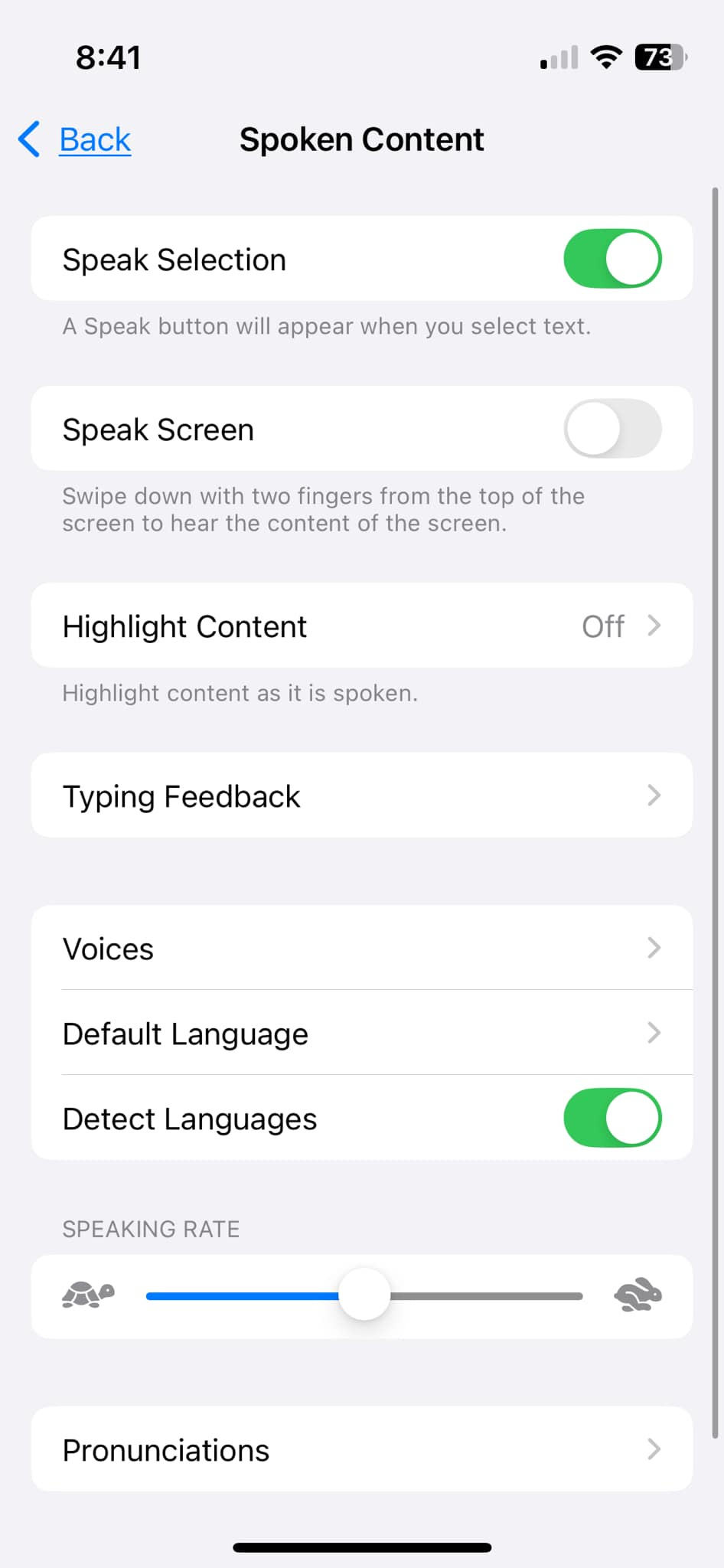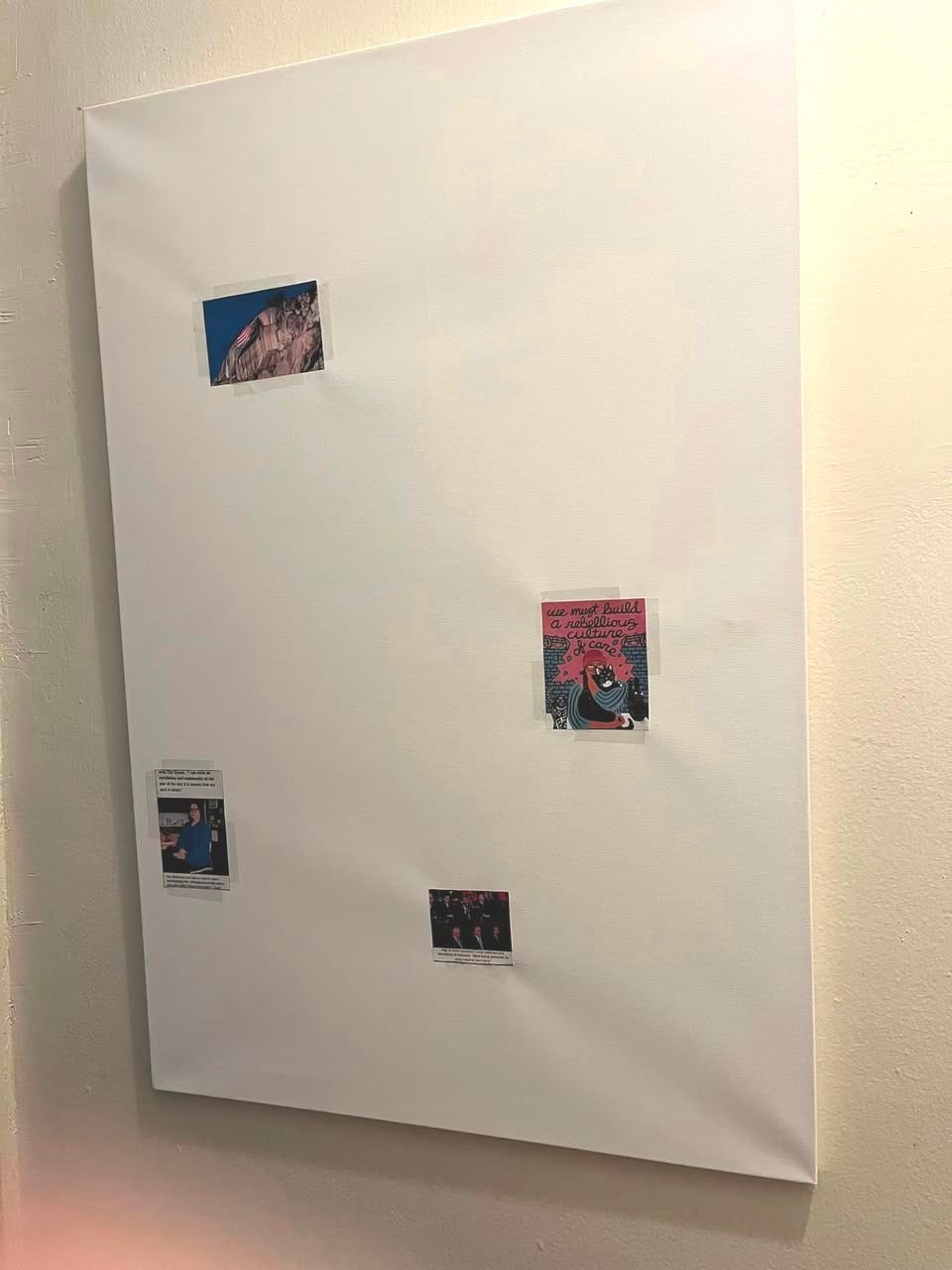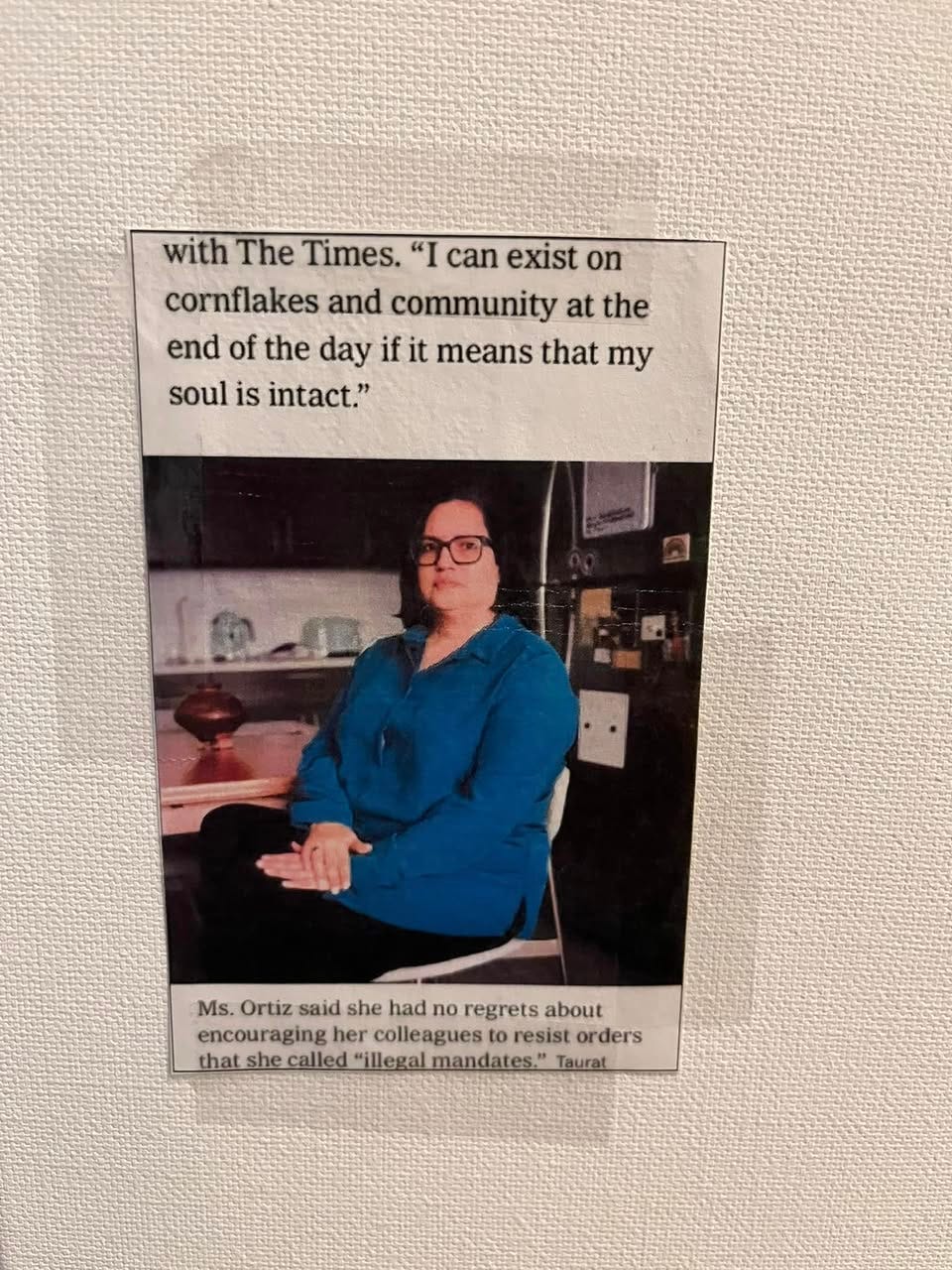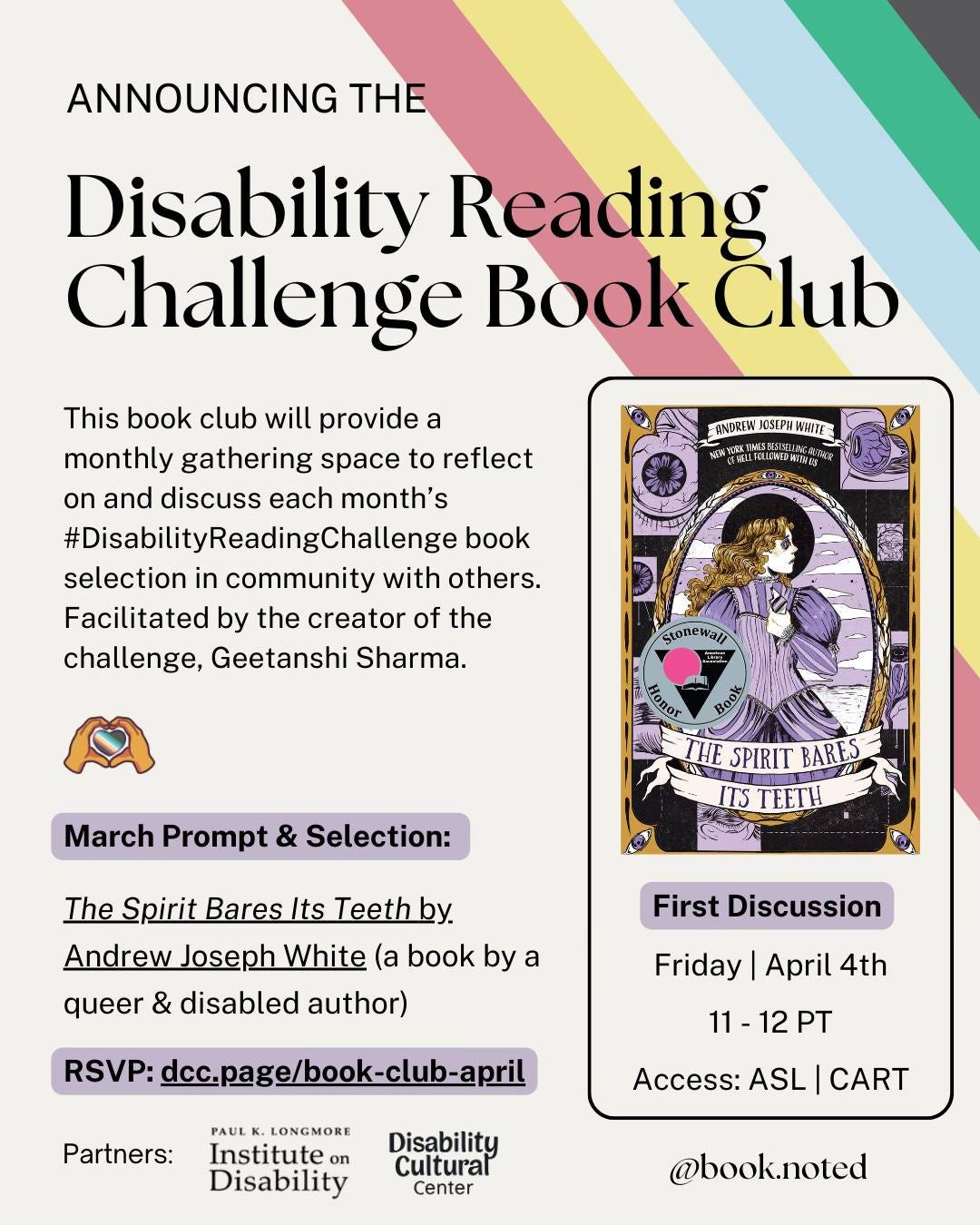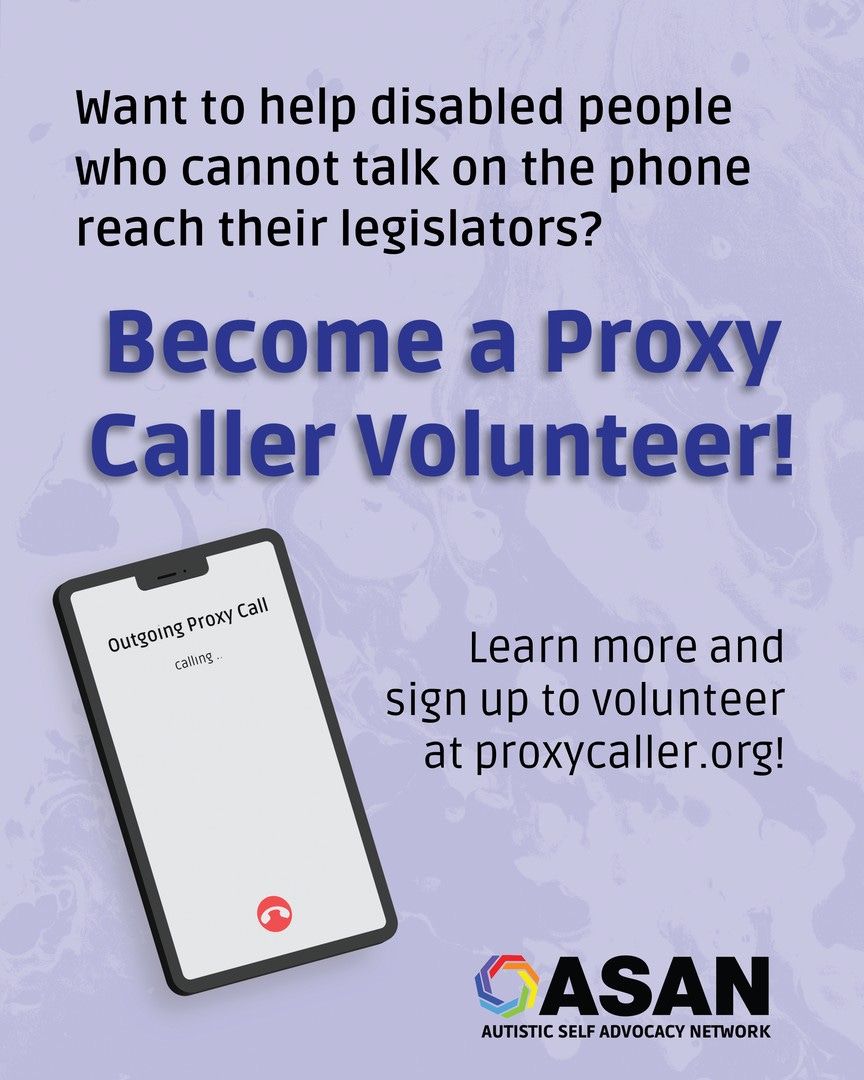On moving past the “toileting / non-toileting” binary into skills for all autistic kids
Also keyboards speak; Hope canvas; medical models and heteronormativity; more growing; beautiful letter; freedom
In this issue…
On moving past the “toileting / non-toileting” binary into skills for all autistic kids (Mar 14)
The medical model of disability, and the heteronormative family (Mar 15)
Making an iPad keyboard speak letters aloud (Mar 12)
In case anyone else didn’t know this…. On Apple devices you can set it up so any time you type on any keyboard it says the letters (or words) that you are typing out loud. This means when you search for buses on YouTube, it will say the letters you type as you type them so your kid can get the audio feedback as well as visual, hopefully helping them use the keyboard themselves in the future.
It’s under Accessibility > Spoken Content > Typing feedback
Canvas of Hope in authoritarianism (Mar 13)
I wrote a long time ago about the deliberate hope practices Daniel and I have decided to commit to that can realistically work for our lives.
One is this collage of freedom. Where we put things on it that have happened that week that embody the future we envision happening around us today. Big stuff from the news, but also the day to day interactions in our community.
It took a while for us to get the canvas and to figure out how to stick things to it. But here it is. I love picturing it fill up with all the resistance and liberation around us.
On moving past the “toileting / non-toileting” binary into skills for all autistic kids (Mar 14)
There are plenty of social media posts out there telling you not to push toilet training for autistic kids. That say things like "interoception" before toilet training.
But I haven't seen anything that acknowledges that even when one can’t use a toilet, it doesn’t mean there aren’t critical skills one can work on. It's like... you're either using a toilet, or we neglect you completely.
Why does this matter? There are many reasons why toileting can be important, including that someone who uses diapers is at higher risk for SA. But there are so many bladder and bowel skills beyond just “use a toilet” that can help someone gain privacy and independence.

Also because we can’t be ND-affirming and say “speech isn’t the only form of communication”, but then stop as “use a toilet when you’re ready and in the meantime, too bad”.
This feels like a prime example of not really knowing what it looks like to take a non-behavioral lens with autism. There are many disabilities where it's clear using a toilet in a typical way isn't going to happen and so there are plenty of discussions out there to help gain other necessary skills or find accommodations. But we don’t apply those same frameworks and language to autistic kids - why not?
What would it look like if we included, alongside toileting, a discussion of different skills one could gain regardless of if they ever are able to use a toilet or not? In no particular order:
The importance of changing dirty incontinence products
Communicating the need to change a dirty incontinence product
Being able to go into a bathroom to change incontinence products
Being able to go into a stall to change incontinence product
How to know when they are going to have a bowel/bladder movement (interoception - this one gets talked about a lot)
Communicating that they will have a bowerl/bladder movement
How to know AFTER they've had a bowel/bladder movement
Being able to pull down their own pants
Being able to take off their own incontinence product
Being able to clean themselves
Being able to put on a new incontinence product
Being able to cleanly and hygienically dispose of an incontinence product
Being able to select the kind of incontinence product they prefer - pull up? tabs? etc
Being able to identify the right size of incontinence product
Let’s do better for our autistic kids and make resources focused on dignified and hygienic bladder and bowel movements in whatever way is accessible to someone, rather than toileting.
The medical model of disability, and the heteronormative family (Mar 15)
I think from time to time about that conversation I had early on with the head of ABA at a top, reputed therapy-agency in NYC. This was the woman who oversaw their whole behavioral program - ABA and Floortime. If I remember correctly, she had a PhD in ABA (or whatever that would be).
We had already read the anti-ABA stuff, but A- had just gotten a diagnosis around 2 years old and we wanted to be well informed about our options. So I shared with her my hesitations, and listened to her with an open mind to understand what we may be missing.
I remember she talked about how A- had to learn how to imitate, so he can learn.* "After all, he needs to be able to stand in the bathroom with Dad when he's older so he can learn to shave."
I think about this because it had ZERO impact on me. But it must be designed to really tug at the heartstrings of parents. Heteronormative parents who have some vision of what it means to "grow into a man". Dad's who are like "woohoo! I have a boy! One day I will teach him how to fish, hunt, and shave!". It wasn't just about tapping into the part of you that wants a normal kid, it's about tapping into the part of you that sees normal as being related to acting gender as well.
If A- was a girl, would she have said "After all, you want to be able to have them learn how to curtsy / wear make-up / shave their legs"?
I know there are literal playbooks for ABA practitioners to use when convincing skeptical parents that ABA is great. Luckily, I think those playbooks may not be designed for us.
* I've written before about how wrong that is (notably when A- taught himself how to pump a swing).
And he just keeps growing…! (Toenail cutting) (Mar 15)
Sometimes algorithms and groups will show me videos of dyspraxic autistic teens and adults getting their haircut (in a respectful way). Where they'll move their body away from the chair, go back to it, away from it again, back to it, sit down for a few minutes of a cut, and then run away again.
I've often watched these videos (sometimes they’re shared in FB groups in a shaming way like - “if your autistic kid isn’t like this, you’re doing something wrong!”) and known that that wasn't A-. Not yet anyway. That it probably takes years of really hard work - of gaining trust, of making a kid feel safe, of never forcing them to do things they don't want to do - to eventually get to that point.
And, recently this is exactly what happened with A- when I went to cut his toenails. As with all of us, toenail cutting is not exactly the most fun activity we can do! But given A-’s current skills, I took an approach I had never done before. I explained (again) why cutting toenails are important. I knelt on the ground in front of him. And I told him that when he's ready, he could put his foot on my thighs and I'd cut one toenail. He stared at my thighs. I suppressed my urge to keep talking (which is very, very hard for me! I stayed silent waaaay longer than I normally would). He kept staring at my thighs. Staring some more. And then..he put his foot on my thigh, let me cut one toenail as promised, and then moved away.
I don't post about A- and challenges or hygiene since I can’t ask him for consent, but hopefully he'll be ok with this post since it's about how amazing he is. And because nobody likes cutting their toenails!
Good one!!! (Mar 17)
One of A-s new favorite phrases is “good one” (“Avenue” is still going strong). This comes from high fiving dad and dad saying “Good one!” Although he never actually said it until one day when I high fived him and said “Good one!”
Anyway, this is a great phrase for me because now when I’m at home and going about my day, someone is shouting “Good one!”
Walk to the kitchen… “good one!!”, drag A- around on a sheet… “good one!!”, sit down… “good one!”
Our house has suddenly become a positive reinforcement house!! But not by the adults
Our beautiful parent letter (Mar 19)
Our district IEP person who’s assigned to us said “your beautifully written letter about A-“ in response to the parent letter we submitted.
Of course, they still won’t include him, but it’s nice to have the letter recognised as beautiful.
Parenting with freedom (Mar 20)
I had a conversation with a radical, disability justice oriented acquaintance who recently had a baby. She was telling me about briefly getting sucked into the “here’s what your baby should be doing!” culture, and I told her next time to just reach out to me!
That it’s been a journey for us, but that unlike the well-meaning, even progressive parents, who will tell you if your baby isn’t walking when they’re supposed to, “Don’t worry! Some kids are late walkers!” I’ll say “Don’t worry! Not everyone walks and that’s ok! And here’s some great people who don’t walk who you can listen to!” If your baby isn’t speaking, I won’t say “Don’t worry! Everyone speaks at their own time”, I’ll remind you that communication is so rich and diverse and give you lots of things to read by and about a diverse array of communicators.
I told her that I didn’t think parenting was harder for us, and in some ways it’s been easier. Because A- forced to us to realize that parenting is about seeing him for who he is, not for who another person is, which allowed us to let go of all the “shoulds”. And letting go of the “shoulds” makes parenting soooo much easier. It’s how parenting should be for every child, and we’re lucky we had no choice. So it’s a gift I’m happy to pass on to others.
I’m thinking now that I’ll give all new parents I know, no matter who their kid is, Raising a Rare Girl by Heather Lanier. I think it’s a way to give everyone the gift we were lucky enough to receive.
Blog without text
What I’m reading or listening to
This song felt really relevant to our parenting journey. There’s no expert out there to give you a shortcut. There’s no shortcut to raising a human.
I’m excited to join the Disability Cultural Center’s Disability reading challenge! I just got their first book from the library!
Help non-speakers who use AAC to reach their legislators! Become a proxy caller volunteer with ASAN!
This article, Superbabies don’t cry, was written by Heather Lanier before the book that I linked to above. If we can’t give every parent the Heather Lanier book, hopefully they can at least read this article.
As part of Adam Wolfond (non-speaker)’s art exhibit in Toronto, they put on this panel called “LOUDMOUTHS: an autistic non-speakers’ rally”, and it was just released as a video!
My organization, MediaJustice, is doing a livestream tomorrow (Friday) on IG with the just-fired FTC Commissioner Alvaro Bedoya. Join us!



